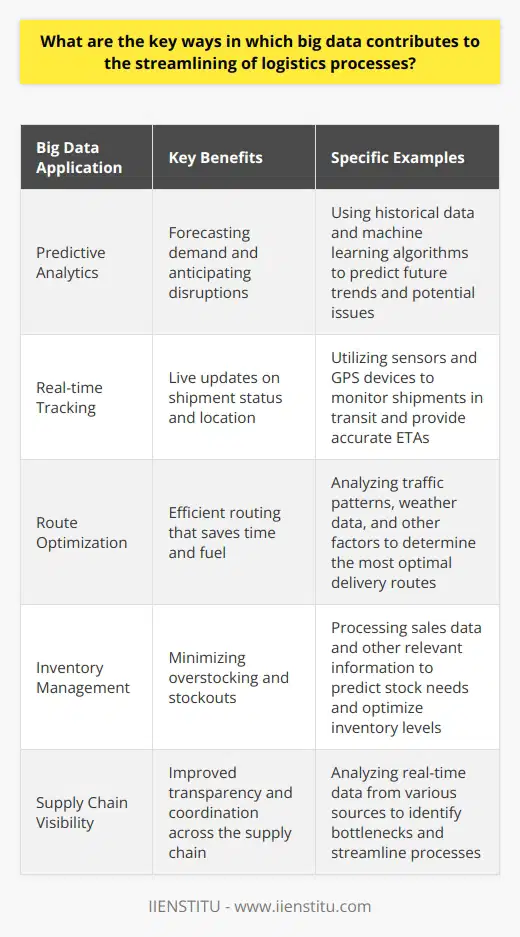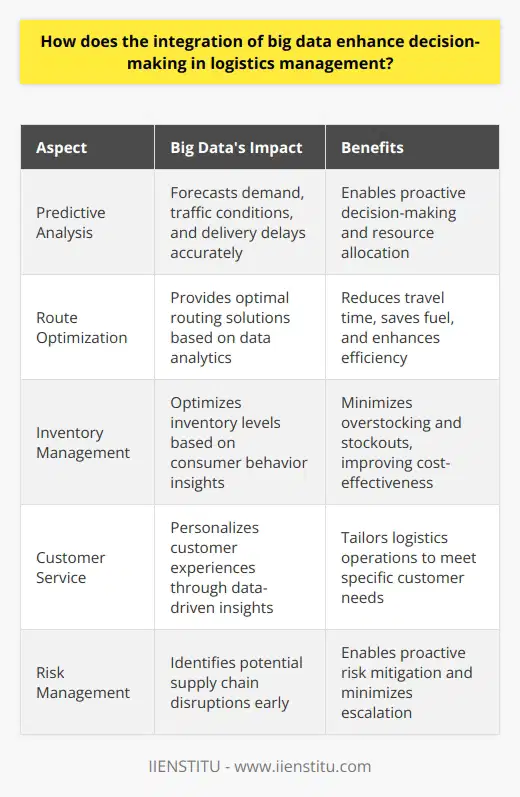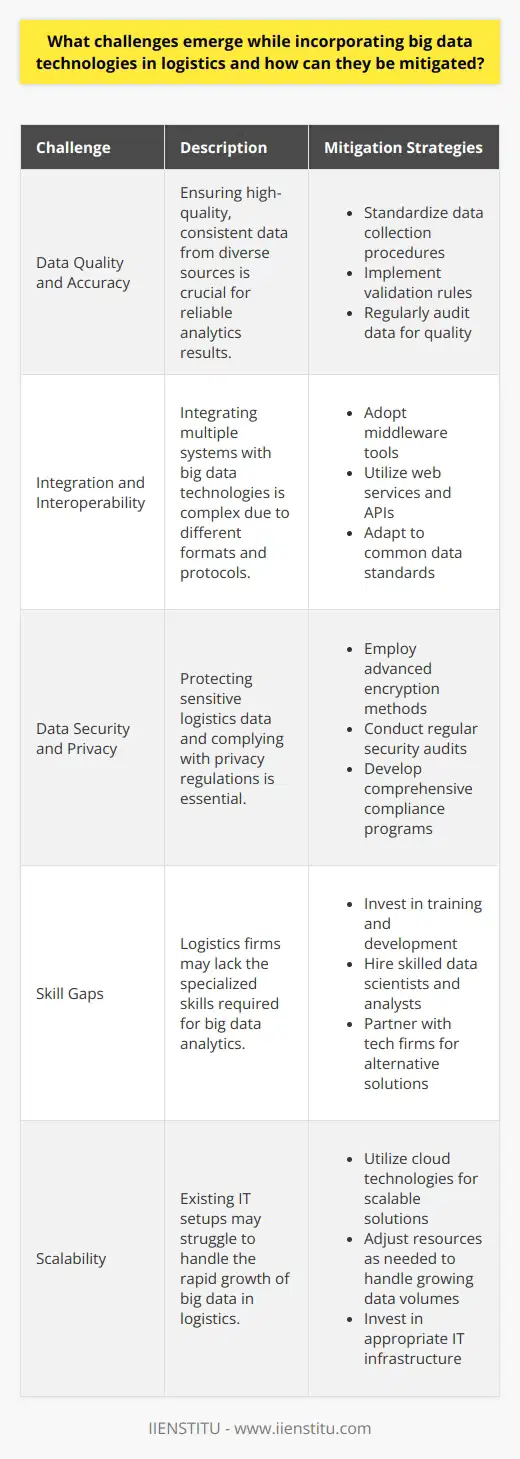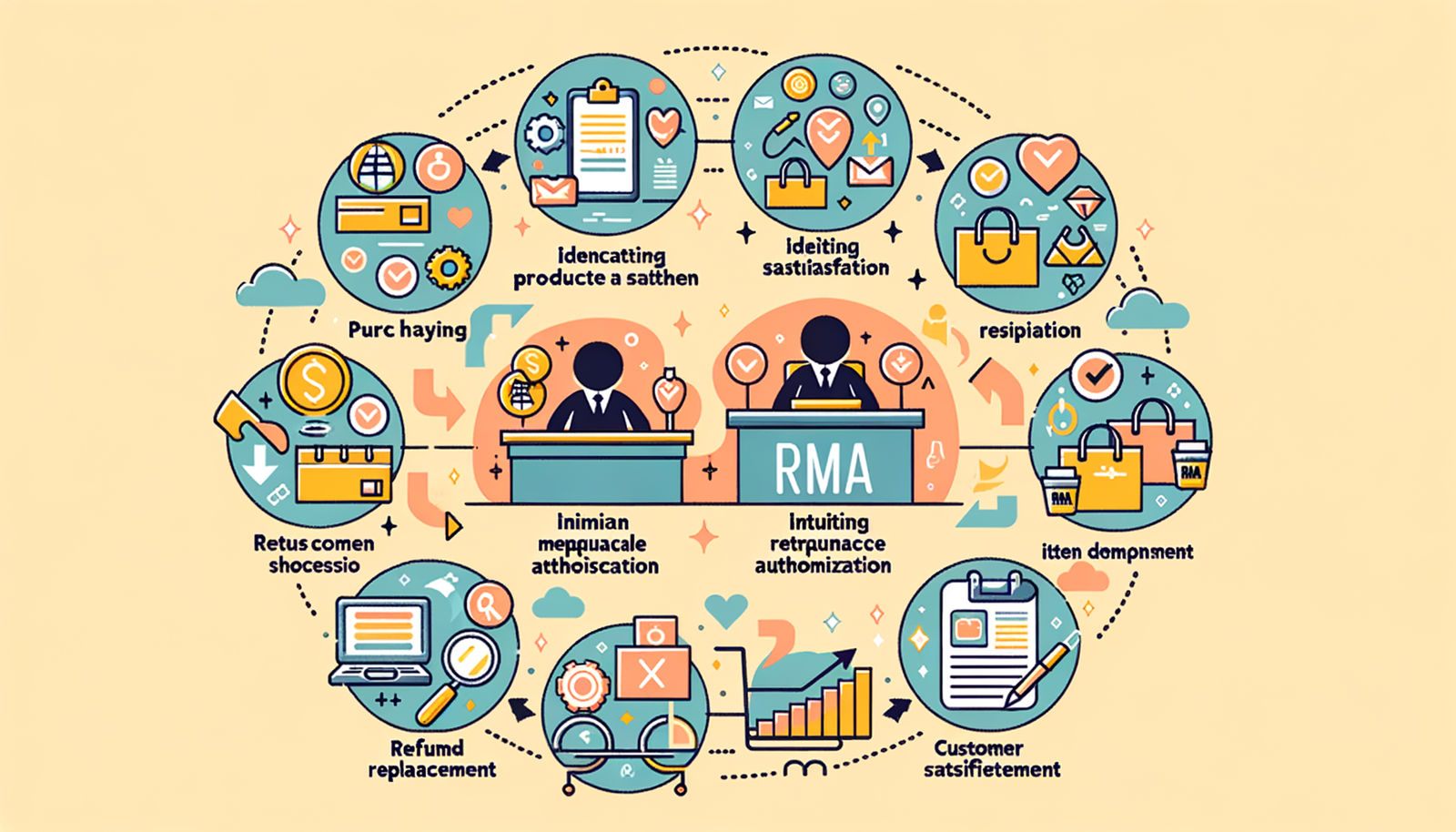
The digital age has ushered in an era where data, colloquially termed "the new oil," acts as the central axis around which the wheel of modern industry spins. Amongst myriad sectors imbibing this paradigm shift, logistics stands out as a critical adopter of this data-driven revolution. The advent of Big Data, consisting of vast and complex datasets that traditional data-processing software cannot adequately handle, is reshaping how goods are moved, stored, and delivered across the globe.
As we navigate this intricate interplay, we witness a transformative alignment between logistical prowess and advanced analytics, with remarkable implications for efficiency and optimization.
Emergence of Big Data in Logistics
Overview of the logistics sector historically
Logistics, with roots tracing as far back as the organized armies of ancient times, has long been a thread in the fabric of civilization's progress. Historically, the sector's evolution was punctuated by milestones such as the development of the wheel, the establishment of trade routes, and the advent of the steam engine, each introducing new efficiencies in the movement of goods. However, these changes took centuries to unfold, synchronous with the steady pace of technological and social developments of their respective eras.
The role technology has played in advancing the logistics sector
The twentieth century witnessed an unprecedented acceleration in technological advancements, shrinking the world through modern transportation and communication systems. The logistics sector evolved rapidly with the rise of containerization, advancements in cargo aircraft, and the inauguration of sophisticated freight management systems. Now, the fusion of logistics with technology goes beyond physical conveyances to encompass the realm of information processing, where decisions are aided by the instantaneous flow of data.
Explanation of how Big Data has emerged in logistics
Big Data made its foray into logistics as an almost natural consequence of the sector's need to cope with burgeoning global supply chains and increasing customer demands. Companies began to accumulate a wealth of data from every link in their supply chains, seeking to extract actionable insights and predictive analytics to anticipate market trends, manage inventories, and optimize delivery routes. This deluge of data, if harnessed correctly, promised unparalleled control over the intricate networks of modern logistics.
Examples of the use of Big Data in logistics
Today, global logistics giants employ Big Data to predict shipping volumes, dynamically adjust to weather patterns, and even mitigate geopolitical risks that could disrupt supply chains. Tracking systems feed real-time data into analytical algorithms to preempt bottlenecks and improve turnaround times. For example, a leading courier delivery services company employs advanced prediction models to adjust their staffing and routing in anticipation of package volumes, dramatically improving their efficiency and customer satisfaction.
The Importance of Big Data in Logistics
Discussion on how Big Data provides actionable insights in logistics
At the core of the utility of Big Data in logistics lies its ability to transform copious amounts of raw information into valuable knowledge. Whether it's a manufacturer determining the most cost-effective time to ship goods or a retailer accurately predicting stock levels to avoid over or understocking, the insights derived from Big Data analytics empower firms to make informed decisions swiftly and accurately. This high-octane decision-making apparatus is the hallmark of an agile and responsive logistics system.
Explanation on how Big Data enhances supply chain efficiency
The enhancive effect of Big Data on supply chain efficiency is indisputable. By analyzing patterns within large datasets, companies can identify inefficiencies and streamline operations. For instance, route optimization algorithms can analyze traffic data, weather forecasts, and vehicle performance metrics to chart the most efficient paths for delivery fleets. Furthermore, by integrating logistics certification programs focused on Big Data competencies, a new echelon of data-savvy professionals is emerging to steward this optimization.
Examples of real-world applications and benefits of Big Data in logistics operations
Real-world applications of Big Data are replete with success stories. Take, for example, the international retailer that harnesses Big Data to synchronize its supply chain operations across multiple countries, achieving remarkable reduction in wasted inventory and improving its bottom line. Then, there's the e-commerce giant employing predictive analytics to stock warehouses based on purchasing trends, thereby slashing delivery times and enhancing consumer satisfaction. It is in these tangible triumphs that the benefits of Big Data are most potently realized.
Challenges in Implementing Big Data in Logistics
Discussion of the apprehension and lack of understanding about Big Data
Despite its many advantages, the implementation of Big Data in the logistics industry is not without challenges. There exists a palpable apprehension among traditional companies, rooted in a lack of understanding of Big Data's potential and the fear of the unknown. Legacy systems and conventional practices often dominate the conversation, creating a resistance to change that can impede adoption. Educating stakeholders and showcasing the undeniable advantages of Big Data is imperative for its broader acceptance.
Discussion on the infrastructural challenges in implementing Big Data in logistics
The infrastructural demands of integrating Big Data analytics into existing logistics systems are significant. Migrating from older information systems to sophisticated analytics platforms requires substantial investment in technology and training. Moreover, the sheer scope of data management necessitates robust IT infrastructure, capable of not only handling the volume and velocity of the data but also protecting it against potential cyber threats and ensuring compliance with data privacy regulations.
Demonstration using examples how the industry has overcome implementation hurdles
Nonetheless, there are inspirational precedents where the logistics industry has strategically managed the transition. For instance, logistics enterprises are now partnering with tech companies to bridge the expertise gap, a mutually beneficial arrangement augmenting their capabilities. Others are pursuing certificate courses online to upskill their workforce, ensuring teams are adept at navigating and exploiting the data-rich landscape. Through such concerted efforts, the industry is steadily overcoming the stumbling blocks that stand in the way of fully embracing Big Data.
The Future of Big Data in Logistics
In-depth look at how Big Data is shaping the future of logistics
The future visage of logistics, sculpted by the hands of Big Data, promises unprecedented efficiency and responsiveness. Big Data is the cornerstone of innovative solutions like anticipatory shipping, where products are shipped before the customer even makes a purchase based on predictive analytics. With the advancement in IoT (Internet of Things), real-time data from connected devices continuously enrich the analytical processes, enabling adaptive logistics systems that respond dynamically to changing conditions.
Insights on prospective trends in Big Data within the logistics sector
Prospective trends in Big Data within logistics are poised to further disrupt the sector. Expect to see more companies leveraging cloud-based analytics for scalability and cost-effectiveness. Artificial Intelligence (AI) and Machine Learning (ML) advancements will augment Big Data’s impact, allowing for even more nuanced predictions and decision-making. Technologies like blockchain may also find increased adoption for its ability to provide transparent and secure data sharing within the logistics ecosystem.
Examples of how emerging technologies like AI and Machine Learning are amplifying the impact of Big Data in logistics
Already, AI is optimizing warehouse operations with robots that autonomously navigate storage facilities, while ML algorithms refine demand forecasting models to near-perfection. Autonomous vehicles, guided by vast datasets and sophisticated ML, herald a future where the movement of goods may require minimal human intervention. These are not far-flung fantasies but burgeoning realities that attest to Big Data’s expansive influence on logistics as we sail into the twenty-first century's data-driven horizon.
Conclusion
Summary of key points in the blog
This exploration of Big Data's role in logistics has unveiled its transformative capabilities—from providing granular insights into supply chain operations to enhancing overall efficiency and shaping a more predictive, responsive industry. The cases detailed not only capture Big Data's current applications but also its vast potential despite the complexities of its full integration into the logistics sector.
Brief discussion of the potential impact of these developments on the logistics sector in the future
As we look ahead, we envision a future where the logistics sector becomes an exemplar of data mastery, with logistics certification programs continually evolving to embrace the innovations that Big Data consistently ushers in. The potential impact of these advancements on the sector is immense, suggesting a trajectory towards an era defined by intelligent logistics in service of an ever-demanding global economy.
Final thoughts and reflections on the topic
In closing, the symbiosis between Big Data and logistics appears ordained by the sheer necessity for heightened efficiency in a complex world. While challenges persist, the dynamism of the logistics sector, coupled with the relentless march of technology, indicates that Big Data's role will only grow more central. Companies that embrace this, investing in the necessary infrastructure and training—whether through traditional means or certificate courses online—are likely to emerge as leaders in the streamlined logistical landscape of tomorrow.
Frequently Asked Questions
What are the key ways in which big data contributes to the streamlining of logistics processes?
Big data reshapes logistics.
Big Data in Logistics
Understanding Big Data
Big data means vast information collections. These collections are too complex for traditional processing. They require advanced analytics. Such analytics can reveal patterns and insights.
Streamlining Logistics
Streamlining logistics is crucial. Efficiency and precision matter. Big data offers solutions.
Predictive Analytics
Big data enables predictive analytics in logistics. This involves forecasting demand. It includes anticipating disruptions.
Real-time Tracking
Big data allows real-time shipment tracking. Sensors and GPS devices generate data. This data is analyzed for live updates.
Route Optimization
Big data optimizes delivery routes. It processes traffic patterns and weather data. Efficient routing saves time and fuel.
Inventory Management
Big data aids inventory management. It processes sales data to predict stock needs. This minimizes overstocking and stockouts.
Supply Chain Visibility
Visibility is essential in supply chains. Big data improves it. It analyzes real-time data from every link in the chain.
Customer Experience Enhancement
Big data enhances customer experiences. It does so by personalizing services. Delivery times can be optimized.
Cost Reduction and Sustainability
Cost savings result from big data. Streamlined operations mean less waste. Optimized routes reduce carbon footprints.
- Efficient Asset Utilization: Big data ensures assets like trucks and warehouses are used optimally.
- Reduction of Delays: Big data analytics helps foresee and mitigate potential delays.
- Dynamic Pricing Models: Big data informs dynamic pricing strategies based on demand and capacity.
Challenges and Considerations
While beneficial, big data comes with challenges. Data privacy is a concern. Proper management and analysis tools are necessary.
In conclusion, big data is changing logistics dramatically. Efficiency and customer satisfaction are the main gains. The future of logistics will lean heavily on big data's evolving capabilities.

How does the integration of big data enhance decision-making in logistics management?
Big Data's Role in Logistics Management
Introduction to Big Data in Logistics
Logistics management thrives on accurate, real-time information. Big data integrates vast data sets. It allows for comprehensive analysis. This integration aids strategic decision-making. It also enhances operational efficiency. Logistics professionals use big data to predict trends. They spot patterns and make informed decisions.
Enhancing Decision-Making
Big data supports several decision-making aspects:
- Predictive Analysis: Logistics managers forecast demand accurately. They predict traffic conditions. They also anticipate delivery delays.
- Route Optimization: Data analytics provide optimal routing solutions. Managers reduce travel time. They also save fuel.
- Inventory Management: Insights into consumer behavior optimize inventory levels. Overstocking and stockouts decrease.
- Customer Service: Big data analytics personalize customer experiences. They tailor logistics operations to customer needs.
- Cost Reduction: Efficient logistics operations cut costs. Data-driven strategies target wasteful spending.
- Risk Management: Managers identify potential supply chain disruptions early. They mitigate risks before they escalate.
Big Data in Action
Let's explore how big data transforms logistics:
- Real-time Tracking: Managers monitor shipments in real time. They respond to issues immediately.
- Sensor Data Utilization: Sensors on cargo provide valuable data. This data improves handling and storage.
- Market Trend Analysis: Big data tools analyze market trends. Logistics align with these trends swiftly.
- Supplier Performance: Companies assess supplier reliability. They ensure partnership quality with data.
Big Data Tools and Technologies
Several tools and technologies empower big data in logistics:
- Cloud Computing: Offers scalable data storage. It provides powerful analytical tools.
- Machine Learning: Algorithms predict outcomes. They improve with more data input.
- Internet of Things (IoT): IoT devices capture and transmit data continuously.
- Data Visualization: Tools convert data into understandable formats. Decision-makers grasp complex information quickly.
Challenges and Considerations
Implementing big data involves challenges. It requires:
- Robust data management systems.
- Investment in technology and training.
- Commitment to data privacy and security.
Conclusion
The integration of big data is crucial. It empowers logistics managers to make better decisions. It enhances efficiency and service quality. Investment in big data analytics will likely grow. It offers a competitive edge in the logistics industry.

What challenges emerge while incorporating big data technologies in logistics and how can they be mitigated?
Big Data Challenges in Logistics
Incorporating big data technologies into logistics entails numerous challenges. Each of these challenges requires careful consideration.
Data Quality and Accuracy
Success hinges on data quality. Erroneous data leads to misguided insights. Logistics companies often struggle with data cleansing. Big data sources are diverse. They encompass IoT devices, tracking systems, and customer interactions. Consistency in this data remains crucial. High-quality data ensures reliable analytics results.
To mitigate these issues, companies invest in robust data governance frameworks. They include:
- Standardizing data collection procedures
- Implementing validation rules
- Regularly auditing data for quality
Integration and Interoperability
Logistics involves multiple systems. Integration of these systems with big data technologies is complex. Different formats and protocols add to the difficulty. Interoperability between new and legacy systems poses challenges.
Solutions involve adopting middleware tools. These help to bridge different technologies. Web services and APIs facilitate smoother integration. Adapting to common data standards improves interoperability.
Data Security and Privacy
With big data, security concerns escalate. Logistics data often includes sensitive information. Companies must protect this data rigorously. Privacy regulations like GDPR demand strict compliance.
To tackle these issues, logistics firms employ:
- Advanced encryption methods
- Regular security audits
- Comprehensive compliance programs
Skill Gaps
Logistics firms might lack big data expertise. Big data analytics is complex. It requires specialized skills.
Training and development become essential. Hiring skilled data scientists and analysts is another approach. Partnerships with tech firms offer alternative solutions.
Handling Real-Time Data
Logistics is dynamic. Real-time data management is essential. Traditional databases struggle with this need.
Stream processing technologies provide a remedy. Tools such as Apache Kafka enable real-time data processing. Investing in appropriate IT infrastructure supports these technologies.
Scalability
Big data grows rapidly. Logistics systems must scale accordingly. Scalability challenges often overwhelm existing IT setups.
Cloud technologies offer scalable solutions. They allow companies to adjust resources as needed. This flexibility ensures that systems can handle growing data volumes efficiently.
Change Management
Introducing big data disrupts existing workflows. Employees may resist changes. Adoption of new technologies can stall.
Structured change management is necessary. It includes:
- Clear communication of benefits
- Training workshops
- Providing support during transition
Big data holds transformative potential for the logistics sector. Addressing these challenges allows companies to reap the benefits. Improved efficiency and decision-making await those who successfully integrate big data technologies.



